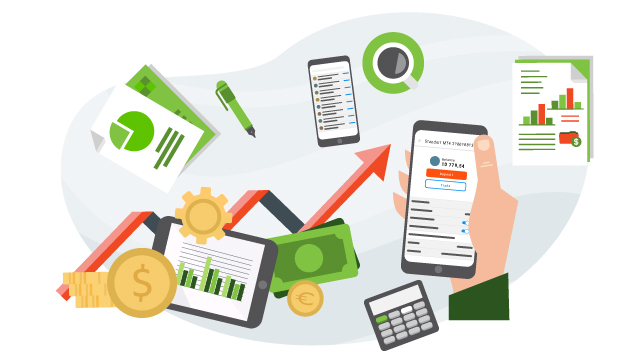How to Diversify your Investments and Start Living

Diversification is your pain killer pill if it ever comes to losses. Traders with balanced portfolios tend to be more secure about their failures, manage risks better, and avoid dramatic shortages of funds. However, it can only reduce pain, but won’t cure it. Remember, diversification alone does not guarantee that you will never lose again or that you will build a fortune in a year; it works more as a shield, a personal airbag that may soften any stroke of bad luck, save your nerves, and let you feel secure.
The whole idea behind diversification is not to put all the eggs in one basket; that is, to collect a set of assets that will react differently during the same economic events. If you create a smart and varied portfolio, the word downturn will lose its negative connotation once and for all because it is not necessarily bad in a context for all assets.
OK, we are step-by-step kind of people, and like the info to be all organized and dosed. Let’s keep to the plan below.

1. Make an Investment Plan
First, be true to yourself and reasonable to determine how much money you can afford to invest. It is usually an extra amount apart from emergency savings and monthly income. Besides, decide whether you want your investments to be accessible or you want to store them for a while.
Taking all of this in mind, define your goal. Do you want a new car or plan to retire in your early forties? Set a time frame for your target. It is critical to the further choice of assets because some are riskier but with a greater opportunity of return while others are more conservative and stable. Thus, don’t forget to measure how risk-tolerant you are!

2. Choose your Tool
Every day you get mixed signals and gradually become more and more confused. What trading instruments to choose? How to stay sane, tracking the performance of each of them in the market? Is it possible to analyze all the assets you trade?
FBS got you covered. The FBS mobile personal area was designed for those who own balanced portfolios. Here is why:
- Access all your accounts and the instruments you use in them via a single login. So, no need opening several windows or be distracted. All your assets are with you 24/7, and you may reach them on the go from any place around the world.
- Track the history of all your transactions and analyze how this or that asset behaves under certain market conditions.
- With the help of personal statistics per trading tool, decide whether each of them fits your trading strategy. If yes, you will scale up the tactics. Alternatively, you’ll rebalance the list of assets to minimize the negative dynamics.
- The interface is straightforward, which saves you precious minutes on navigation. Use the time you bought to respond to the signals of the volatile market.

3. Diversify Assets
With a detailed investment plan at hand and a reliable tool for diversification, you are ready to pile up a mix of various assets that suit your needs and desires.
Usually, the experts advise to keep at least four of the following investment classes:
| Class | Risk | Description |
| US Stocks | Medium |
The US stocks are considered an essential element in your diversified portfolio. They work well in the long run. Select the stocks of companies from various sectors to make the portfolio work, notwithstanding the trends in the industries and economic volatility. The most popular spheres now are energy, finances, materials, IT, consumer discretionary, healthcare, real estate, etc. If the stocks are very far from the circle of your competence, do not buy them. |
| Short-term investments (FX, commodities) | Unpredictable |
FX currencies are short-term assets made to be traded, not owned for long. However, FX currencies are a must-have in today’s unstable political and economic environment. If, for example, you start losing faith in USD and fear it may drop soon, buy a different currency you believe to be more stable and have growth potential. Owning a range of currencies allows you to stay on a safe side because when one currency falls, the other must be rising – they are interconnected. Commodities are very sensitive to the global and local events in the economy, politics, and even harsh weather changes. So, the market is somewhat volatile. The best time to invest in commodities is when the inflation rate is high or in case of deficit/excess of a particular commodity. However, experts advise not to include more than 5% of this asset into your diversified portfolio. |
| Indexes | Relatively low |
When buying a ticker symbol of one index, you simultaneously diversify your funds across the companies this index represents. It is the right choice for those who want to spend the minimum amount of time tracking and rebalancing the investment portfolio. |
| Cash | Low |
Keeping your money in a bank or under a pillow is the easiest, the least risky way to invest. However, the gains are extremely low or next to zero even. Besides, the buying power of cash weakens over time. |
Please notice, that with FBS you trade indexes and stocks as CFDs, which can be in many ways advantageous.
4. Rebalance
Never stay 100% satisfied with your current set of assets. Over time, your goals may change together with the overall situation in the world. So, be ready to redistribute the investments to fit your needs better. Don’t be afraid to be wrong about your first allocations and be brave to rebalance promptly.
5. Avoid Bad Investment Decisions
- Do not invest in assets that you do not understand.
- You won’t become king-rich with just a $500 investment in a short period. Whoever promises you this is a liar, an ill-willed person, your mum won’t be happy if you befriend him.
- Binary options and financial pyramids are a strict no-no.
- Diversification works better when applied to long-term strategies. So, plan better and see a big picture.
- More isn’t always better. Keep a manageable amount of assets in your portfolio – around 20. Too many choices may be overwhelming and can suck out all your strengths. As a result, you will fail with all your abundant list of instruments you trade. Remember to diversify within an asset that is to buy, for example, stocks in different sectors. Keep it simple, productive, and stress less.
- Start investing as soon as possible. In case you enter the market young, you will have more chances to risk, lose, study, dive deeper into the financial field and benefit with skill.
Your age matters for the selected investment strategy and asset allocation. The older you are, the less amount of stocks you are advised to own. You can try and apply a simple formula: 100 – your age = % of stocks to buy. For example, at the age of 36, you can afford to own 64% of stocks. There is an alternative approach from a world-known investor Warren Buffet who offers to invest 90% in the S&P index fund and 10% to governmental bonds.
But, do not rely blindly on any advice you get. You’d better analyze your goals, trust in your investment plan and consider age, risk, and current financial possibilities.

Bottom Line
Diversification is excellent for your investments if not overdone. Being no financial gamblers, we ask our clients to be reasonable and precautious when selecting asset classes for their portfolio and allocating assets within a class.
When investing with FBS, concentrate on diversifying the portfolio with various currencies, indexes, and metals. Besides, try stocks. With us, you can not only buy them and wait for the price to rise in the long-term perspective, but also to sell when the market conditions are favorable. Use FBS mobile personal area to analyze the performance of all your assets and never loose track of the events that influence the market.
A mixed set of investments may bring a balance of stability and potential growth but won’t be a panacea for avoiding losses or becoming filthy rich. You should instead diversify assets to cultivate self-discipline, cherish confidence in the market, and avoid the fear of failures.




